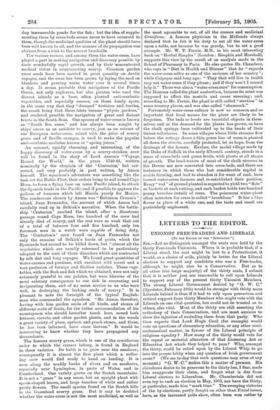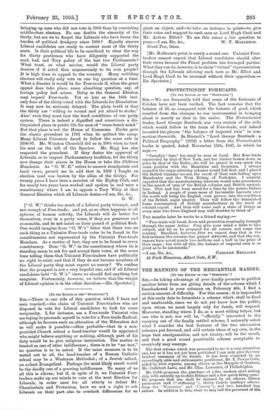[To THE EDITOR OP THE "SPECTATOR. "] Sra, — Let us distinguish amongst
the seats now held by the thirty Free-trade Unionists. Where it is probable that, if a Liberal stood, the seat might be lost to a Protectionist, it would, as a choice of evils, plainly be better for the Liberal electors to support any candidate who was a Free-trader, although be might also be a Conservative. But as to all other (the large majority) of the thirty seats, I submit that it is neither just nor reasonable to call upon Liberals to support any of the present thirty Unionist Members. The strong Liberal Government desired by " G. W. C." (Spectator, February 18th) would be stronger with thirty more Liberals behind it than if it had to rely upon precarious and critical support from thirty Members who might vote with the Liberals on one vital question, but could not be trusted as to others, also vital. Most of the thirty are still asserting the orthodoxy of their Conservatism, and are most anxious to show the injustice of excluding them from that party. Who then expects that Lord Hugh Cecil (for example) would vote on questions of elementary education, or any other semi- ecclesiastical matter, in favour of the Liberal principle of religious equality ? How many of the thirty would vote for the repeal or material alteration of that Licensing Act or Education Act which they helped to pass ? Who, amongst the thirty, could be relied upon by the Liberal Whip to go into the proper lobby when any question of Irish government arose ? (We see to-day that such questions may arise at any moment.) "G. W. C." makes this a matter of persons. His chivalrous desire to be generous to the thirty has, I fear, made him exaggerate their claim, and forget what is due from Liberal electors to Liberalism. Mr. Chamberlain did not even try to rush an election in May, 1903, nor have the thirty, in particular, made him "mark time." The sweeping victories of the by-elections, partly fought on other than Fiscal issues, have, as the increased polls show, often been won rather by
bringing up men who did not vote in 1900 than by converting middle-class electors. No one doubts the sincerity of the thirty, but are we to forget the Liberals who have borne the burden of political drudgery since 1886 ? Equally sincere Liberal candidates are ready to contest most of the thirty seats. Is their political life to be sacrificed to clear the way for thirty gentlemen who have diligently supported the mad, bad, sad Tory policy of the last two Parliaments ? What trust, or what service, would the Liberal party deserve if it acted. thus ungenerously to its own people ? It is high time to appeal to the country. Many wobbling electors will really only vote on one big question at a time. What a disaster it would be for Free-trade if, when the great appeal does take place, some absorbing question, say, of foreign policy had arisen. Delay in the General Election may imperil Free-trade. Yet so late as the 16th inst. only four of the thirty voted with the Liberals for Dissolution- It may now be seriously delayed. The plain truth is that the thirty are " willing to wound and yet afraid to strike." Alas ! even they must face the hard conditions of our party system. There is indeed a dignified and sometimes a dis- tinguished place in public life for men of " cross-bench mind." But that place is not the House of Commons. Burke gave the classic precedent in 1791 when he quitted the camp. Many Liberal Unionists dared to follow the same rule in 1886-87. Mr. Winston Churchill did so in 1904 when he took his seat on the left of the Speaker. Mr. Rigg has also respected the precedent. If they desire the approval of Liberals, or to respect Parliamentary tradition, let the thirty now change their places in the House or take the Chiltern Hundreds. As " G. W. C." refers to narrow standpoints and local views, permit me to add that in 1892 I fought an election (and was beaten by the allies of the thirty). For twenty years I have been a member of the Eighty Club, and for nearly two years have worked and spoken in and near a constituency where I am to oppose a Tory Whip at that General Election which all Liberals desire.—I am, Sir, &c., G. W.
[" G. W." thinks too much of a Liberal party triumph, and not enough of Free-trade ; and yet, as so often happens in all spheres of human activity, the Liberals will do better for themselves, even in a party sense, if they are generous and reasonable, and do not insist on their pound of political flesh. One would imagine from " G. W.'s" letter that there was no such thing as a Unionist Free-trade voter to be found in the constituencies not represented by the Unionist Free-trade Members. As a matter of fact, they are to be found in every constituency. Does " G. W." in the constituency where he is standing mean to ask for and accept their votes, at the same time telling them that Unionist Free-traders have politically no right to exist, and that if they do not become members of the Liberal party they must expect no mercy ? We confess that the prospect is not a very hopeful one, and if all Liberal candidates held " G. W.'s " views we should feel anything but sanguine. Fortunately, however, we believe that the weight of Liberal opinion is in the other direction.—En. Spectator.]







































 Previous page
Previous page